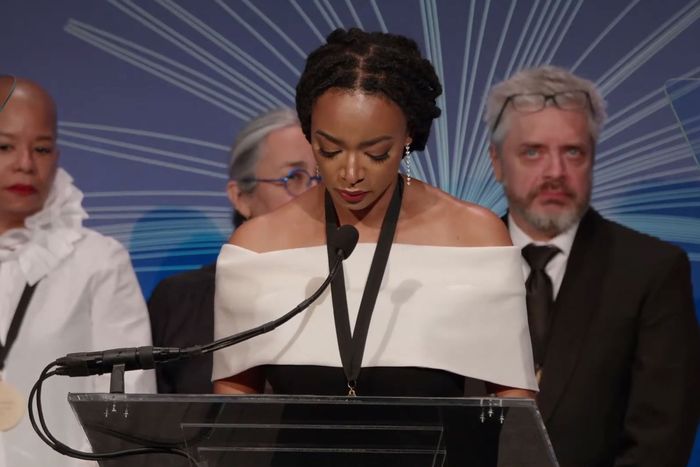
As 18 nominees and winners shuffled offstage after last night’s 74th annual National Book Awards ceremony, a reporter couldn’t help but state the obvious to another colleague: “It was so not controversial at all.” “It,” of course, referred to the much-whispered-about pro-Palestine statement that closed the event. Read by Aaliyah Bilal, nominated for her short-story collection Temple Folk, the brief declaration called for a cease-fire in Gaza “to address the urgent humanitarian needs of Palestinian civilians, particularly children.” Flanked by winners including Justin Torres (fiction, Blackouts), Ned Blackhawk (nonfiction, The Rediscovery of America: Native Peoples and the Unmaking of U.S. History), and Stênio Gardel and Bruna Dantas Lobato (literature in translation, The Words That Remain), Bilal’s soft voice radiated around the Cipriani Wall Street ballroom: “We oppose antisemitism and anti-Palestinian sentiment and Islamophobia equally, accepting the human dignity of all parties, knowing that further bloodshed does nothing to secure lasting peace in the region.” Cheers and a partial standing ovation met her words.
Largely absent was any “disruption” predicted by the New York Times after two sponsors of the event, Zibby Media and Book of the Month, declined to attend the ceremony. On November 14, Zibby media founder Zibby Owens wrote on Substack that rumors of the finalists promoting “a pro-Palestinian, anti-Israel agenda” onstage forced her to pull her financial support, declaring, “I don’t believe in censorship,” followed by “a line as simple as ‘Free Palestine’ or ‘from the river to the sea’ … has come to mean the antagonization of an entire religion, not just a place.”
As cocktails got underway Wednesday night, animosity was hard to find in the crowd of writers, including fiction authors Jenny Han and Casey McQuiston, book-adjacent celebrities like actress and Insta-reader Kaia Gerber, and the influencer and published author Tinx. On line for the bar, Pulitzer-winning poet Jericho Brown — sharp in a burnt-orange suit — hadn’t heard of any dissension in the hours leading up to the event. “I didn’t see the statement, I don’t know what might have been offensive to those organizations, but I am sure that it is not strange for a literary organization to be antiwar and pro-peace,” he said.
DeafBlind poet and activist John Lee Clark, nominated for his collection How to Communicate, and his Protactile interpreter Colleen stopped by to greet Brown (“Kaveh Akbar said I had to read your work and I couldn’t put any of your things down,” Clark enthused). After they departed, Brown reflected on difficult conversations with friends since war between Israel and Hamas broke out on October 7. “I have yet to understand how the phrase ‘Free Palestine’ is offensive unless you think Palestinians belong in prison. And I don’t actually think anybody believes that, you know what I mean?”
A few hours later, Brown would bring the room to a standstill with “Canary.” Presenting Lifetime Achievement honors to poet Rita Dove, he recited her poem to a chorus of “Aww”s from the audience, landing with emphasis on “If you can’t be free, be a mystery.” The concept of freedom dominated speeches throughout the two-hour ceremony, from host LeVar Burton’s fiery opening remarks (“It was my mother who taught me at a very young age that if you can read in at least one language, you are, by her definition, free”) to Oprah’s emphatic screed against book bans ending on the Toni Morrison quote, “The function of freedom is to free somebody else.” Jeremy Tiang, chair of the panel judging translated literature, acknowledged the five-year-old category’s history of honoring books reflecting “some of the most pressing issues of the day, such as Palestinian liberation and displaced people to climate change.” Heid E. Erdrich, presenting the prize for poetry, spoke on behalf of her fellow panelists: “While we have the joy of honoring powerful poems of beauty, language, love, family, history, trauma, genocide, colonial dispossession, and survival, while we reward our accomplishment in our art form tonight, human suffering in Gaza is at the forefront of our thoughts.”
Thwarting any misunderstanding about the statement’s intentions, Bilal told Vulture after the ceremony that “the point isn’t to demonize anyone that’s suffering. There are Israeli families suffering right now and there are Palestinian families suffering right now.” The show of solidarity, Bilal added, was organized by winner Torres, with Bilal writing the message after input from all the nominees. It was crucial, she said, not to “inflame” the subject. “When it was clear to me what the intention was, I just felt in my heart, who could disagree with this?” Indeed, last night’s ceremony — the awards for books vociferous in their condemnation of oppression, and the calls for freedom, human dignity, and lasting peace for all — served as a reminder that literature is inextricable from the cause of humanity. As longtime City Lights bookseller and Literarian Award winner Paul Yamazaki put it, “The whole world is shaped by what the writers do.”


